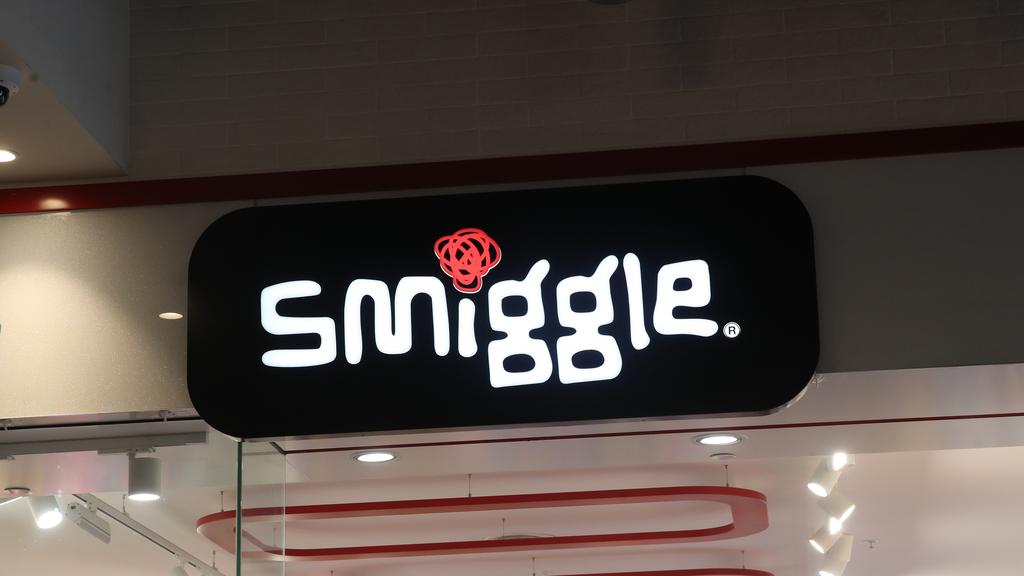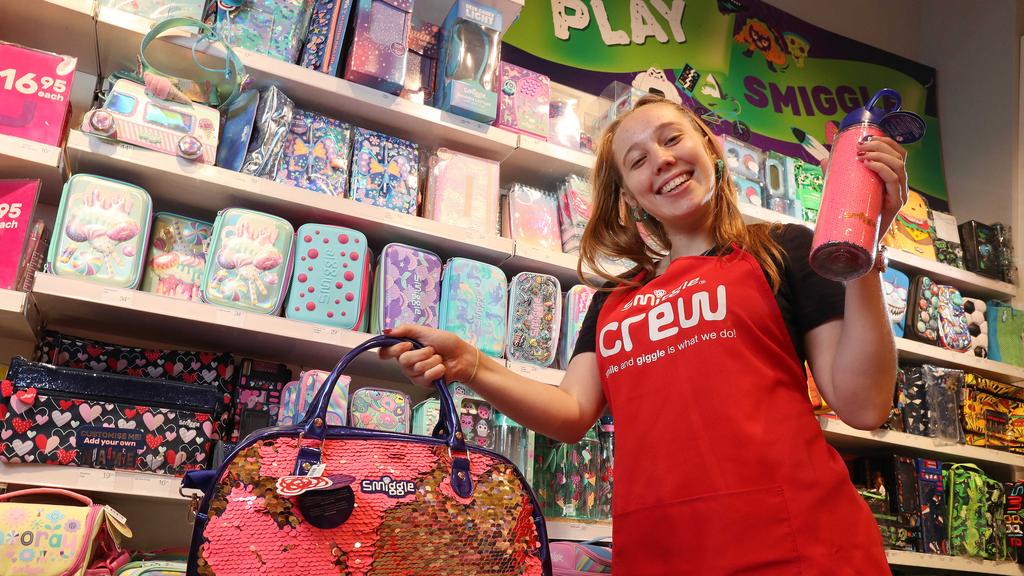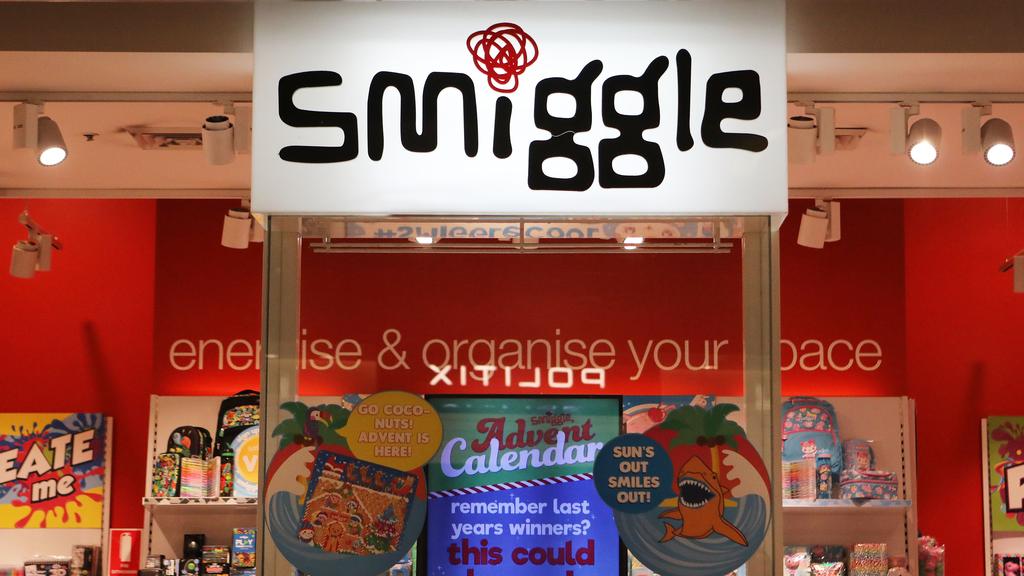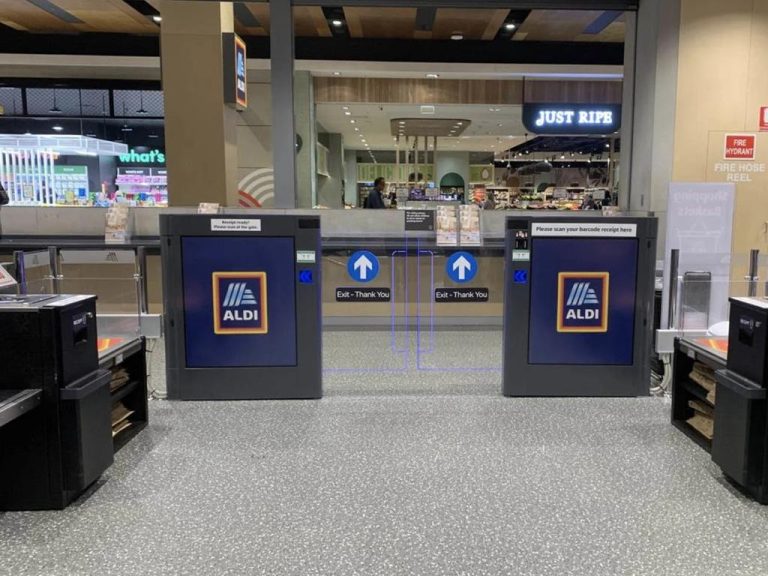Smiggle closes 56 stores globally amid fierce online competition
Once the ultimate status symbol in classrooms across Australia, Smiggle’s vibrant pencil cases and quirky accessories were more than just stationery – they were a cultural phenomenon.
But today, the brand that once ruled the schoolyard is facing its toughest test yet, as fierce competitors like Temu and Amazon chip away at its glittering empire.
Smiggle’s story is one of meteoric rise and dramatic decline.
In 2023, the Australian stationery giant was riding high, expanding into new markets and posting record global sales of $319.8..
Fast-forward to 2025, and the picture couldn’t be more different.
Global sales have plunged 10.7 per cent year-on-year to $264m, following a 7.4 per cent drop the previous year.
MORE NEWS
Revealed: How Chinese retailers are crushing Australia’s shopping giants
Every Reject Shop about to disappear for good
Major supermarket chain on cusp of closure
The brand, once the crown jewel of billionaire Solomon Lew’s Premier Investments portfolio, is now grappling with shrinking stores, cost-of-living pressures, and a retail landscape dominated by cutthroat competitors.
And Smiggle isn’t alone. A seismic shift is undoubtedly underway in the Australian retail landscape, if a recent survey of 1000 Australians by e-commerce marketing platform Omnisend is anything to go by.

Once the ultimate badge of primary school cool and a billion-dollar retail powerhouse, Australian stationery icon Smiggle now finds itself at a crossroads.
The survey reveals that an astonishing 76.6 per cent of Australians have made a purchase from a Chinese marketplace in the past year, a significant leap from 70 per cent in 2024.
This isn’t just a casual flirtation.
Over half – 51.6 per cent – admit to frequenting more than one of these platforms, and a striking 14.9 per cent are shopping on them at least once a week.
With Australia home to around 27.5 million people, according to the Australian Bureau of Statistics, that means approximately 4,097,500 Aussies shop at Temu, Shein, or other Chinese marketplaces weekly.
Temu: The new retail juggernaut
Temu, in particular, has emerged as a retail juggernaut.
In 2025, 63.1 per cent of Australians reported shopping on Temu, an explosive increase from 51.7 per cent the previous year.
This rapid ascent has propelled Temu to become the second most visited shopping website in Australia, trailing only the global behemoth, Amazon.
“These marketplaces are no longer fringe players. Temu is now the second most visited shopping website in Australia, just behind Amazon,” Marty Bauer, an e-commerce expert at Omnisend said.
“Its rapid growth has also raised the visibility of other Chinese marketplaces, putting pressure on both local retailers and global giants.”
The pressure is palpable.
MORE NEWS: No-staff KFC vending machine hidden in Aus

Retail assistant Meg Milton, 17 of Fitzgibbon, at the Smiggle store, Chermside. Photographer: Liam Kidston
Iconic Australian retailers are falling victim to this e-commerce revolution.
Fashion giant H&M recently shut its Queen Street Mall store in Brisbane, ending a 10-year run for one of its flagship Queensland outlets.
Globally, H&M’s net profit halved compared to the previous year, with 125 physical stores closing in 2024 alone.
Closer to home, Rip Curl and Kathmandu announced plans to close at least 14 stores nationwide after their parent company, KMD, posted a staggering $105 million annual loss. The loss included a $45.5 million non-cash write-down of its Oboz footwear line and followed a consumer boycott over Rip Curl’s controversial advertising decisions.
Other retailers, including the Accent Group, Ally Fashion, and SurfStitch, are also shuttering stores due to declining sales, with the Accent Group alone closing 17 Glue Store locations.
Smiggle’s struggle to stay relevant
For Smiggle, the challenges are mounting.
Premier Investments acquired Smiggle’s parent company, Just Group, in 2008, and by 2016, the brand had revolutionised Australia’s stationery market.
Smiggle didn’t just sell school supplies – it sold a lifestyle, turning everyday items into colourful, fashionable accessories that kids and tweens couldn’t resist.
“Their products were aimed primarily at children and tweens, and they quickly became a sort of status item in classrooms,” Griffith University retail expert Graeme Hughes told News.com.au.
At its peak in 2019, Smiggle boasted more than 350 stores globally across Australia, New Zealand, and the UK.
Even the pandemic couldn’t keep it down for long; after a slowdown during school lockdowns, the brand rebounded in 2023 with record-breaking sales.
But the cracks were already beginning to show.

The schoolyard status symbol that became a billion-dollar empire is fighting for survival due to plummeting sales and a spectacular leadership break-up.
By the end of the 2023 financial year, Smiggle was forced to close 56 stores worldwide.
Cost-of-living pressures have hit young families – its core customer base – particularly hard, while budget retailers like Kmart and online giants like Temu and Amazon have ramped up competition.
“There’s a number of factors working against the growth of Smiggle,” Mr Hughes told News.com.au.
“Cost-of-living pressures have been particularly hurting young families, which is their core customer base. They would be cutting back on those sorts of discretionary items.
“Competition in this market has also become fierce. We’ve had national players such as Kmart really stepping up into the space.
“Smiggle is also competing with a highly connected digital ecosystem, with digital competitors like Amazon and Temu able to deliver stationery to your doorstep in a matter of hours.”
While Smiggle has found some success expanding into the Middle East and Indonesia through wholesale partnerships, the brand has struggled to regain its footing in established markets. Adding to its woes, former chief executive John Cheston recently departed for jewellery chain Lovisa, leaving Smiggle without a permanent leader.
Plans to spin off Smiggle as a stand-alone ASX-listed company have been shelved, with Mr Lew focusing on stabilising the brand’s leadership and strategy.
So for now, the future of Smiggle hangs in the balance.







